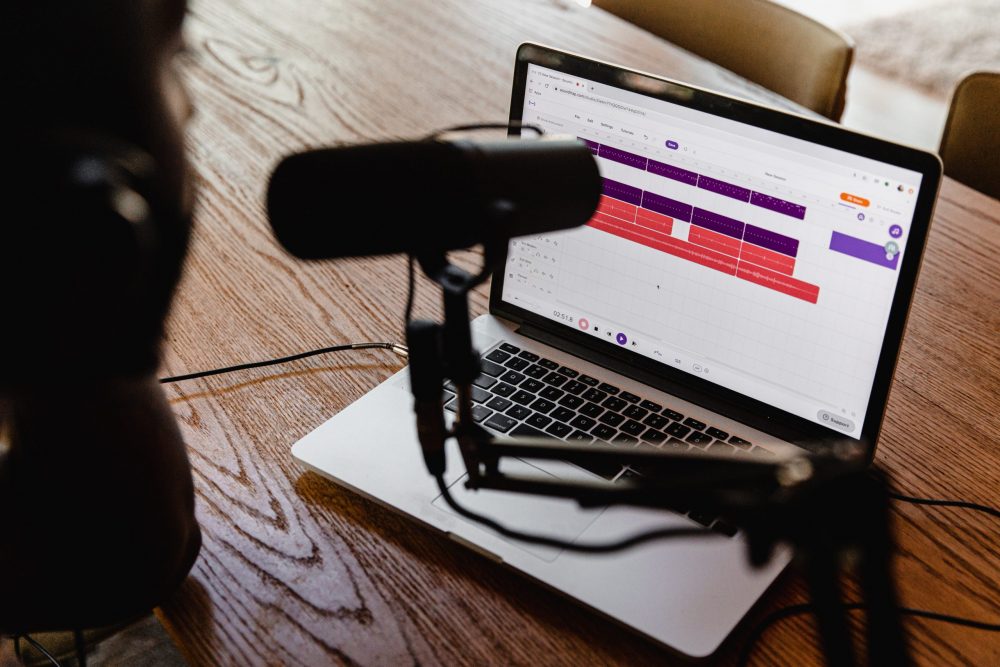These expert insights can boost your podcast’s SEO rankings, one ep at a time.
Here, you’ll find:
- Why more digital marketers are exploring podcast creation
- The latest podcast facts and stats
- What podcast SEO is all about
- Tips for optimizing your podcast
I know there was a time when I could do tasks like washing dishes, folding laundry, and walking the dog without a podcast in my ear, but it seems like a lifetime ago.
Recently, a coworker recently mentioned she has trouble falling asleep without a podcast playing in her ear. I’m sure she’s not alone.
Podcasts are quickly becoming a pillar of content marketing for many brands, businesses, and creators. It makes sense: this form of audio content can help support brand awareness, conversion, and retention strategies.
Whether you’ve already started a podcast or are currently in the planning stages, keeping search engine optimization (SEO) in mind will ensure your strategy is well-rounded. What’s more: it’s easier than you might think.
Let’s take a closer look at the importance of podcasts and how they can fit into your SEO strategy.

Around 155 million Americans over age 12 listen to podcasts. (Image: Unsplash)
The growing trend of podcasts
While the term “podcast” was reportedly created back in 2004, this medium has exploded in popularity over the last 5-10 years.
One of the main reasons is that more and more of us find ourselves multitasking and pressed for time. Podcasts are a way to be educated, informed, or just entertained while we drive and complete menial to-dos.
A big part of SEO is keeping your target audience’s wants and needs in mind. So, as a podcast creator, keeping these factors in mind can help inform how you structure or build your podcast.
The latest podcast facts & figures
Here’s a look at a handful of recent podcast statistics:
- More than 82% of podcast listeners spend 7+ hours a week listening to podcasts.
- Around 155 million Americans over age 12 listen to podcasts.
- 48% of monthly podcast listeners in the United States are between 12 and 34 years of age, while 32% are between 35 and 55.
- In 2021, there were over 2 million active podcasts.
- 62% of American consumers listen to podcasts.
- Over the past decade, the percentage of consumers who listen to podcasts nearly doubled.
Podcasts don’t just create an extra touchpoint for your audience. They can help you build brand awareness, credibility, and trustworthiness.

The easiest way to improve your podcast SEO is to create a landing page for your podcast. (Image: Unsplash)
What is podcast SEO?
Podcasts fall under the category of audio SEO. Since a podcast is a piece of content, it can contribute to your website’s rankings in the same way a blog can.
Podcasts can help your SEO efforts by:
- Building relationships
- Establishing authority
- Contributing to keyword implementation
- Increasing brand awareness
Podcasts can help your ranking more so than something like a webinar because Google now features a podcasts section on the search engine results page (SERP).
Now, let’s dig into a few simple ways to enhance your podcast SEO.
1. Leverage the Google Podcast Manager
Besides allowing you to analyze your podcast’s success through a variety of metrics, Google Podcast Manager can help with your ‘cast SEO.
Your series may already be on Google Podcasts. Make sure to claim it to gain access to Google Podcast Manager. If it isn’t on Google Podcasts, your podcasts can’t be crawled and indexed.
With this handy tool in your arsenal, you can learn:
- Which keywords your podcast ranks for
- When listeners drop off from an episode
- Which devices your audience listens on
- What your target audience searches for
- The relevance of your episodes to your audience’s queries
By using Google Podcast Manager, you’re also submitting your podcast to Google’s directory. This can help it appear across all the available Google platforms, including Search, Assistant, and Home.
2. Create a dedicated podcast landing page
Creating a podcast landing page is one of the most effective ways to improve your podcast SEO. This will make it easier for searchers to find you online, and it gives them a place to land to find out more info.
Having a dedicated podcast webpage (or an entire site, if applicable) also helps crawlers identify this type of content. Meanwhile, you can use the landing page for internal and external linking to boost SEO as well.
Just make sure the page includes all the necessary info about your podcast, such as the show title, description, available listening/streaming platforms, and ways to share.
3. Include written content with each ep
To maximize the effect of your podcast SEO, you can create a write-up or blog post that summarizes or dives deeper into each episode. It can revolve around the same subject and contain a link to the audio.
Since podcast episodes are long-form content, adding a synopsis or helpful links (also called “show notes”) to go with each of them can also be helpful to both listeners and searchers.
This is likely to be more beneficial than merely publishing a transcript of each episode. While transcripts are a great accessibility tool, our experience tells us they don’t generally rank super high.
Also, most searchers are unlikely to take the time to read the whole thing vs. searching for a few key takeaways or interesting tidbits.
Pro tip: To further optimize your podcast, include podcast series and episode Schema markup to your landing pages.

Treat your podcast like any piece of valuable content on your website. (Image: Unsplash)
4. Weave in keywords where you can
Ideally, each podcast episode you create should revolve around its own keyword. Your favorite keyword research tools can help you plan for what terms or phrases to focus on in your episodes.
You can implement this keyword in few areas, such as the:
- Podcast episode title
- Metadata and meta description
- Blog synopsis
- Podcast audio
Because of Google’s sophisticated algorithm, when you mention a keyword during your podcast, the episode is more likely to rank for that keyword or phrase. But, as always with content, avoid keyword stuffing.
5. Prioritize promotion
No surprise here: The more effort you put into podcast promotion through different marketing channels, the more likely it is to gain visibility and help your SEO strategy.
With that in mind, treat your podcast like any piece of valuable content on your website. Some ways to promote it include:
- Social media
- Including links in your relevant blog posts
- In your newsletters or other email marketing
- Paid ads
As far as where to distribute your podcast, you have a handful of third-party options. Some of the most popular platforms are:
- YouTube’s video player
- iTunes
- Stitcher
- Soundcloud
- Spotify
- Google Play
- BrightCove
- Overcast
Pro tip: Request that podcast guests share links to your podcast’s landing page. It never hurts to ask, and they’ll likely want to promote their episode to their friends and followers.
6. Encourage listeners to subscribe and leave reviews
If you’re an avid podcast player, you’ve likely heard hosts ask listeners to rate, review, and subscribe to shows. There’s a good reason for this.
This feedback doesn’t just boost your ‘casts reach, but it can boost your SEO too. Plus, you can leverage these reviews elsewhere, including the homepage, blogs, and social media posts.
The takeaway
The podcast boom doesn’t appear to be turning the volume down anytime soon.
That’s why now’s as good a time as any to throw your hat in the ring by creating your own podcast. They can be an effective method to reach your target audience, improve customer relationships, boost brand awareness, educate, build credibility, and much more.
By implementing the simple tactics above, you can turn each podcast episode into a powerful SEO tool.

